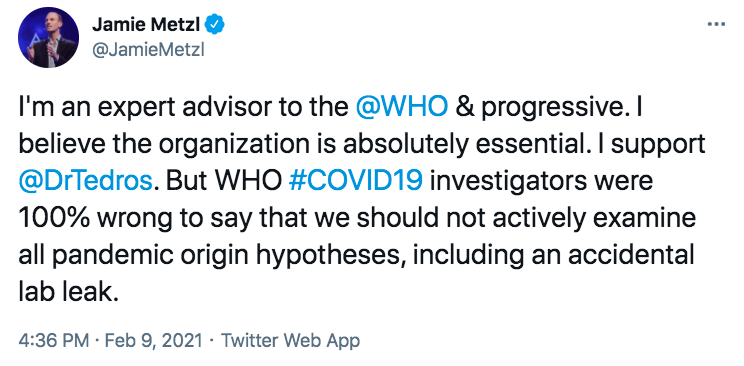WHO's COVID probe in China raises more questions than it answers
Add Axios as your preferred source to
see more of our stories on Google.

Initial findings by a WHO team in China investigating COVID-19's origins appear to echo Beijing's talking points.
The big picture: Identifying the true cause of the COVID-19 pandemic is key to controlling it and preventing the next one, but geopolitical disputes are getting in the way of science.
Driving the news: On Tuesday, a WHO team concluded a two-week trip to China with a press conference announcing their preliminary findings that it was "extremely unlikely" the virus originated in a lab.
- The team said "the most likely pathway" was through an intermediary host species between humans and the virus' original animal reservoir, which is probably a bat.
Details: The possibility that the virus might have leaked from the Wuhan Institute of Virology — a theory that had been pushed by the Trump administration and at least entertained by a minority of scientists — was always an outlier, if only because we've repeatedly seen coronaviruses and other emerging pathogens jump from animals to humans.
- But many experts have criticized the WHO team for ruling out further investigation into a lab leak with a press conference before compiling a full report with clear data.
Between the lines: It didn't escape notice that even as it dismissed the idea of a lab leak, the WHO team opened the door to the possibility that the virus actually originated outside of China, coming into the country via contamination of frozen food.
- There's even less known evidence for that hypothesis than a lab leak, but it is one that has been embraced by Beijing as it seeks to downplay its early failures to contain COVID-19.

Our thought bubble: It's impossible to judge an investigation before its full findings are known, and the reality is that we may never know the true story of COVID-19's origins given the geopolitical stakes involved.
- But this investigation was a chance to highlight the very real danger of spillover from labs doing high-tech work with animal viruses — a danger that is growing by the year — and it would be a mistake to squander it.
